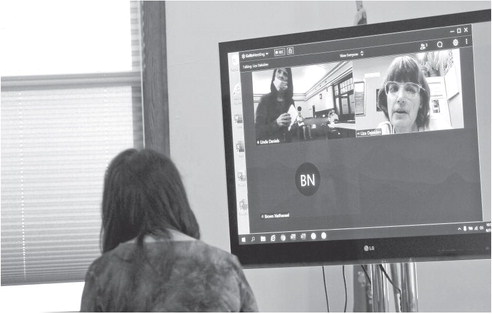Going remote


County OKs policy that regulates employees working from home
Taylor County now has a formal policy governing who and how workers can do their jobs remotely.
In the wake of COVID-19 concerns last spring the county looked at ways to reduced the number of people in buildings while still remaining open to meet the needs of the general public. Particularly within the human services department, this led to a number of employees either requesting or being told to work remotely for part or all of a week.
Human services director Liza Daleiden said that currently there are 15 people in her department who have permission to work remotely for some part of their week. She said that on any given day there are eight or nine human services employees who are working from home.
See PERSONNEL on page 4 Personnel committee approves county policy for working remotely
The issue has been a contentious one for the county involving perceptions of working remotely being a benefi t, concerns over internet security, and the need for accountability of workers’ time. Prior to the COVID-19 pandemic, remote working had not been formally allowed, although it has been common for department heads to answer calls and be accessible to handle situations at all hours of the day or night.
In July the personnel committee directed human resources director Marie Koerner to come up with a remote working policy within 60 days. At the Aug. 27 county personnel meeting, she presented that policy for input and approval from the committee.
Security of the county’s internal networks and employee accountability were two of the major issues reviewed at the meeting. Information technology director Melissa Seavers said both of these issues would be resolved with the expansion of virtual private network (VPN) services. This would allow the employee to log into the servers as if they were in the office with the same sort of security protections and monitoring as if they were at work. The county currently has the capability of two VPNs at one time.
“We don’t have the bandwidth to allow everyone a VPN connection,” Seavers said. However, she said if the county approved increasing the bandwidth for the courthouse they would have the capability of having 30 to 35 using it at one time, this would cost the county about $9,400 per year in additional expense.
Seavers said it would take under 10 minutes to set up laptops to access the VPN. However, she cautioned about how well the VPN would work at people’s private residents because it would be dependent on the individual’s home internet speeds. The VPN slows down any networks it runs on.
Committee member Lester Lewis was adamant about the need for employees to go through the VPN if they wanted to work from home. Currently some are accessing statewide programs directly.
Committee member Scott Mildbrand said he felt the county was rushing into this and while he said he recognizes that there are people who need to be working from home because of health reasons in connection with COVID-19, that they should not be looking at this as a permanent thing.
“We are solving a temporary problem with a permanent solution,” Mildbrand said. He gave the example of his son who works in a private sector firm and who has been working from home since March. He said recently his son’s supervisor directed him to come in and clean out his office since they made the decision to go completely virtual and are selling the office building. Mildbrand said the county needs to think about the long-term when making decisions for remote working, questioning if at some point they may not need a separate human services building and instead move the department back into the courthouse. He said the pandemic is very real, but cautioned against making decisions for the future. “Good decisions are never made under duress,” he said.
Lewis countered that they needed to make decisions to deal with situations going on now. He noted that at some point in the future there may be a pod approach with county employee worksites around the county, but that in order to maintain the security of the county’s networks they needed to address the VPN issue now. He made a motion to approve $10,000 to upgrade the bandwidth and set up the VPNs.
This raised a question from county board member Ray Soper questioning how the personnel committee would have the authority to spend that money. He said he was not opposed to it but felt it should be finance or the information technology committee authorizing it.
“We need to start somewhere,” said committee member Rollie Thums. “I don’t think we can step backward or even stand still. We have to move forward.”
“Where is the money coming from?” asked committee member Tim Hansen. It was suggested that it may be a qualified expense through the Routes to Recovery grant program. It was noted that the vote would send it as a recommendation to the next finance committee meeting. Because of how the county committees are structured there is significant overlap between the finance and personnel committees. The motion passed on a 4-1 vote with Mildbrand opposed.
Several on the committee were concerned about passing the policy as it was presented and if there should be limits on the number of employees eligible to work from home and how those would be prioritized across departments. There was concern expressed that Human Services would monopolize the remote working options and not have any slots available for other departments.
Lewis suggested creating a subcommittee to continue to work on the policy. However county board chairman Jim Metz disagreed saying that Koerner and others were given the task of coming up with a policy and they did that. “All the work these people did should not be thrown away,” Metz said calling for the committee to vote on approving the policy.
It was noted that the policy can be changed at any time in the future, but that the county needs a policy in place to move forward. After a lengthy discussion committee members approved the policy as presented on a 3-2 vote with Mildbrand and Hansen opposed.
The policy will go into effect when the bandwidth is increased to allow for the additional VPN usage. Seavers noted there was a backlog when dealing with service upgrades.
In other business, committee members:
_ On a 4-1 vote with Mildbrand opposed, approved keeping the emergency management director at 40 hours per week rather than 35 hours per week for 2021. The position was raised to 40 hours per week for 2020 with the support of grants through the health department. The difference in pay is $8,668. In supporting the position, Hansen noted that COVID-19 is not going away anytime soon and that the county should support those who are working to combat it on the local level.
_ On a 3-2 vote, approved a wage request from the human services department for employee Misty Hartmann as she transitions into an economic support specialist position from the CANs consortium that will be disbanding in December. She was previously employed in that position. In doing so she is dropping from $24.41 per hour to $23.41 per hour. Because this is higher than the midline for that position’s rating, it required personnel committee approval. There was concern from some on the committee that this would be creating a new position. Human resources manager Marie Koerner said the department has space in its authorized number of employees for the position. Daleiden noted the position was fully funded. Mildbrand noted it was not a unanimous vote from the human services committee to bring the employee back and continued his opposition and was joined by Lewis.

County information technology director Melissa Seavers addresses a question from human services director Liza Daleiden about access through virtual private networks utilized by county employees working remotely.BRIAN WILSON/THE STAR NEWS

Continued from page 1


